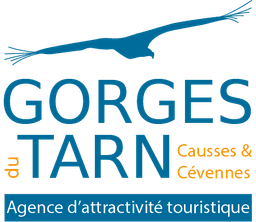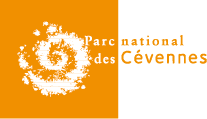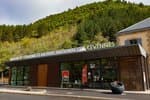
The two bridges
4 points of interest

Source de Quézac - © Nathalie Thomas  Water
WaterQuézac mineral water
Quézac mineral water emerges naturally from the Diva spring, near the entrance to the village, in exceptional surroundings which have been naturally protected for centuries. This pleasant-tasting water is rich in mineral salts and trace elements and is also well-known to be beneficial for the stomach. The spring's water actually comes from Mont Aigoual. According to scientific studies, it takes 30 to 40 years for it to re-emerge in Quézac, after first settling in aquifers, where it acquires its effervescence naturally (rare in France).

Pont de Quézac - © CC Florac Sud Lozère  Architecture
ArchitectureQuézac Bridge
This bridge crossing the river Tarn gives access to the village of Quézac, located on the left bank. Around 1350, Pope Urban V decided to fund its construction to facilitate pilgrims' access to the collegiate church of Notre-Dame de Quézac. It was finished in the 15th century. Its history is punctuated by partial destruction in floods, and by more or less solid rebuilding. It became a listed monument on 27 August 1931.

La cave viticole d'Ispagnac - cevennes-gorges-du-tarn AgricultureThe vintners of Ispagnac
In 2003, Sylvain Gachet, from Savoy, reintroduced grapevines to Ispagnac and Florac, planting six hectares of terraced land. On soils of clay/limestone and schist, he attempted to breathe new life into the Domaine de Gabalie. In 2006, Elisabeth Boyé and Bertrand Servières set up as vintners in the Tarn gorge, also under the stimulus package bringing vineyards back to the valley. They cleared the land of the bartas (brambles) which had invaded almost all the parcels, and rebuilt the dry-stone walls before planting almond trees, vine peaches and five hectares of grapevines: the Domaine des Cabridelles was born. The winemakers share a cooperative cellar in Ispagnac, which is also a sales outlet. Why not make a short stop to try the wines (the cellar is next to the car park by the state school (école publique).
Chevet de l'église d'Ispagnac - cevennes-gorges-du-tarn  Architecture
ArchitectureIspagnac church
St-Peter’s Church in Ispagnac is one of the finest examples of Romanesque architecture in Gévaudan. Built in the 12th century, it is dedicated to Saint Peter and Saint Paul. The understated facade of this bulky-looking building has a simple gate with three semi-circular arches topped by a rose window that lets light into the nave. Once inside, you discover a simple and airy architecture. A sound-and-light show helps you to explore. To get the fullest impression of the architecture, you need to leave the building and walk around it to see the apse and its décor.
Description
1) Turn right to reach Ispagnac bridge. Cross it and continue on the tarred road to the hamlet of Bieissette.
2) Just before the hamlet’s first houses, take the path on the right by the signpost for Bieisses, and continue straight ahead to the barrier marked “Attention vaches, chevaux, refermer la clôture” (Caution: cows, horses. Close the barrier behind you). The path is wide and goes uphill to a track.
3) Turn right onto the track and go through the pine plantation. At the pass, go through a gate (be sure to close it behind you).
4) After the barrier, leave the track and take a small path (waymarked white and red), which can be muddy at times, to a junction with the tarred road.
5) At the road, turn right and 200 m further take the path on the right again, which overlooks the Tarn, to Quézac bridge.
6) Cross Quézac bridge and turn right onto the path that runs alongside the Tarn back to Ispagnac.
7) After the campsites, by the large stone cross, take the paved lane on your right, which will take you back to the square in front of the town hall (mairie). Continue straight ahead on Rue de la Ville to the little square (Placette), then walk up the lane on the left. That takes you back to the main road and your starting-point.
- Departure : Ispagnac: car park opposite the pharmacy
- Arrival : Ispagnac: car park opposite the pharmacy
- Towns crossed : Ispagnac and Gorges du Tarn Causses
Forecast
Altimetric profile
Recommandations
Information desks
Tourism office Cévennes Gorges du Tarn, Ispagnac
Place de l'Église, 48320 Ispagnac
This office is part of the National Park's associated tourist-information network, whose mission is to provide information on, and raise awareness of, the sites and events as well as the rules that must be observed in the National Park's central zone.
Open year-round
Tourism'house and national Parc at Florac
Place de l'ancienne gare, N106, 48400 Florac-trois-rivières
This office is part of the National Park's associated tourist-information network, whose mission is to provide information on, and raise awareness of, the sites and events as well as the rules that must be observed in the National Park's central zone.
On site: exhibitions, video projections, events and shop Open year-round
Transport
- Bus line 258 “Florac – Sainte-Enimie – Le Rozier”, every day in July and August
- Bus line 252 “Ispagnac – Florac – Alès”
Access and parking
Parking :
Calculateur d'itinéraire Lio
Utilisez le calculateur liO pour organiser votre trajet en région Occitanie.
Autres régions
Calculez votre itinéraire en Auvergne Rhône Alpes sur Oùra
Biodiversité autour de l'itinéraire
Source


Report a problem or an error
If you have found an error on this page or if you have noticed any problems during your hike, please report them to us here:


